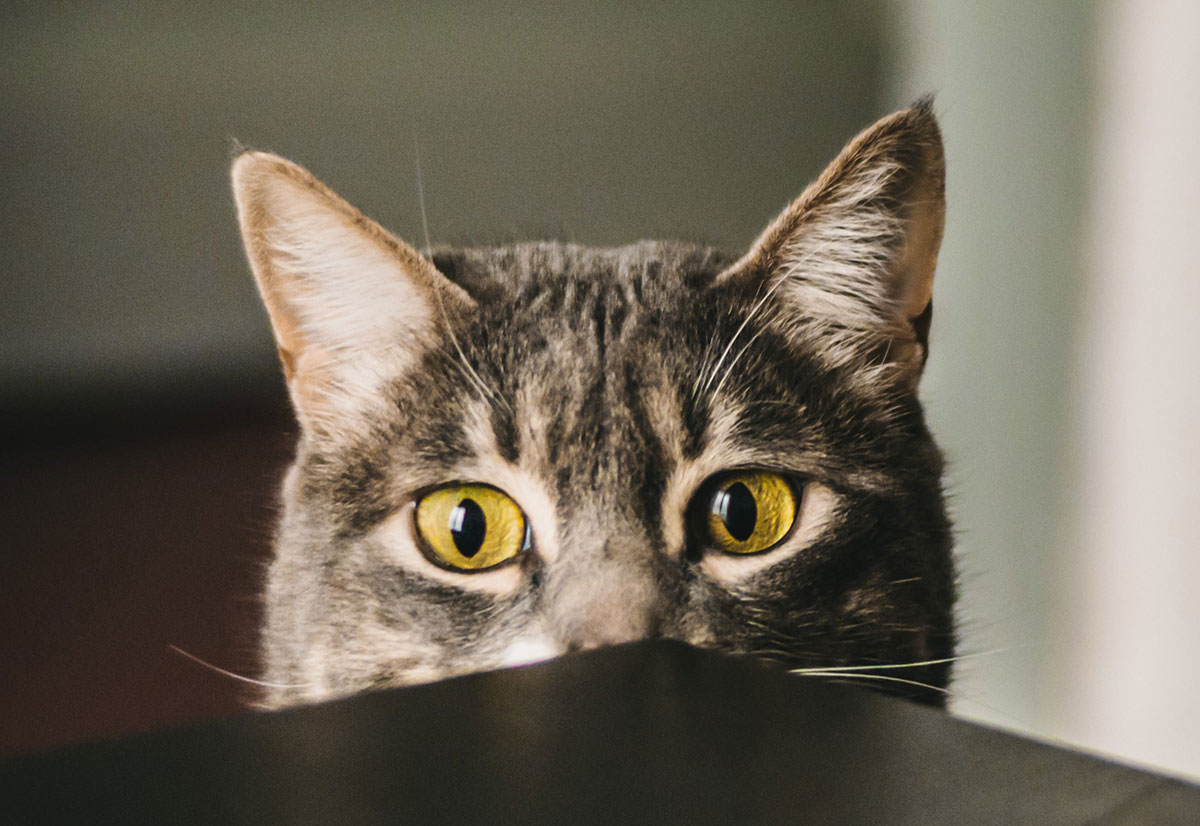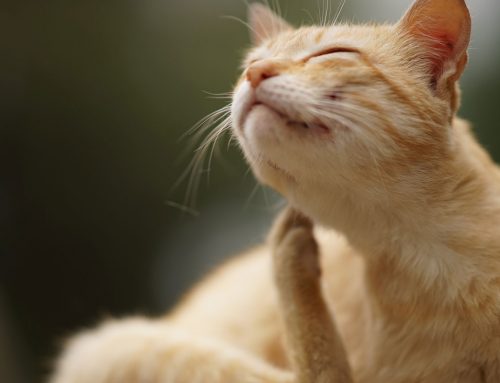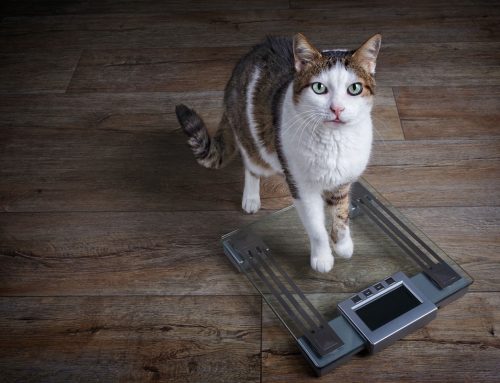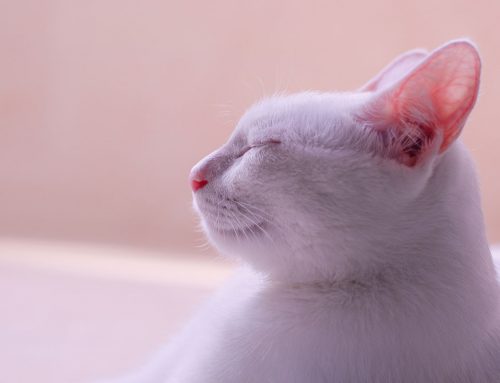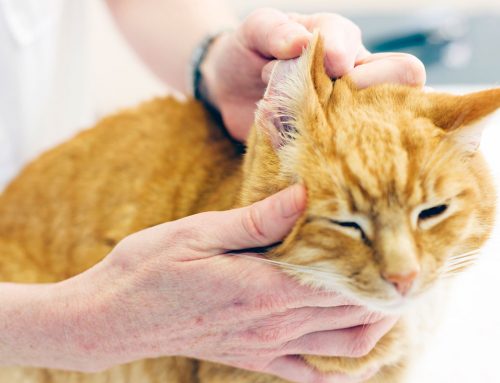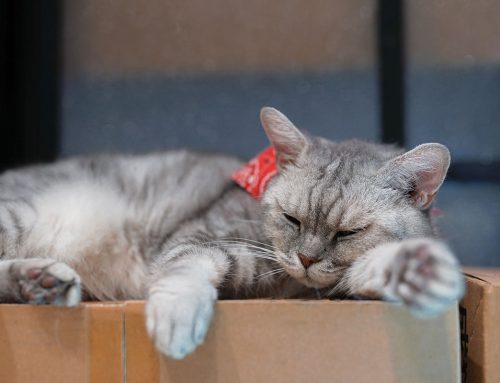Have you ever found cat vomit in your home, or other signs that your cat may have an upset stomach? Turns out, it’s not uncommon for cats to have digestive issues at some point during their lives. This article addresses some of the common symptoms associated with cats who are experiencing digestive difficulty, outlines some potential causes, and then lays out some recommended solutions to keep our furry friends feeling healthy. There is also a short FAQ section at the bottom of the page to help answer some common questions.
What’s Going On? Signs and Symptoms
Common signs that your cat may be experiencing some digestive trouble include vomiting, diarrhea or constipation, loss of appetite, or a shabby/dull coat. Abdominal pain, mood depression, weight loss, hiding and other behavior changes can also occur. Symptoms like these are among the most common reasons that cats are brought to see a veterinarian. These symptoms may be experienced acutely, with an intense, sudden onset, or they may be chronic, occurring over longer periods of time.
Vomiting
Other than an occasional hairball, healthy cats should not vomit several times per month. In some cases, cats may regurgitate their undigested food shortly after eating, while in other cases vomiting may be more sporadic. In a case with frequent vomiting, other symptoms (like dehydration or weight loss) may result from the vomiting itself.
Diarrhea/Constipation
Diarrhea in cats is typically a sign of intestinal inflammation. The stool itself may be watery or mucousy in appearance, and may even contain blood. Other symptoms that may accompany diarrhea include straining, urgency, and having bowel movements outside of the litter box. On the other hand, constipation in cats may be indicated by less than normal defecation frequency, or by noticing an unsuccessful attempt to move it’s bowels.
Why is My Cat Having Digestive Issues? Potential Causes
When it comes to health issues for your cat, your vet is always your best friend. Be sure to consult them in order to rule out more serious health conditions of which stomach issues may be a symptom. For instance, for cats with a longer history of shunning their food or retching, your vet may test for inflammatory bowel disease, cancer, bacterial or fungal infections, or metabolic conditions like hyperthyroidism. Whereas if vomiting or decreased appetite is more recent, they may look to for pancreatitis, parasites, as well as some viral or bacterial infections.
In addition, it’s no secret that cats sometimes eat objects that they shouldn’t (yarn, tinsel or plastic for example), which can get lodged in the digestive system and lead to vomiting. Alternatively, if a cat eats too much too quickly, or is highly active immediately after eating, food can come right back up. Hairballs can also cause vomiting, as well as dietary changes that are too abrupt or frequent. Cats who have developed food allergies or intolerances may also vomit after eating, in which case switching foods and dietary trials may actually be necessary.
Diarrhea in cats can have a number of causes, including parasites in the GI system, viruses, dietary allergies or sensitivity, metabolic diseases of the liver and pancreas, as well as inflammatory bowel disease or cancer.
Constipation in cats can occur when cats don’t get enough fiber in their diet. Alternatively, if cats are not comfortable evacuating when the urge is there, they may hold their stool. This can sometimes occur with house cats who have a dirty litter box. Constipation can also be caused by a buildup of ‘foreign material’ present in the digestive tract (hair, for example), as well as from polyps or growths in the intestines.
What Can You Do?
Treatments and Remedies
If symptoms intensify, or persist over several days and you are worried about your cat’s health, you should always consult with your veterinarian before taking any other action yourself. To determine your cat’s condition, your veterinarian may recommend blood tests, urinalysis, radiographs, ultrasounds, a fecal exam for parasites, viral tests, and/or a thyroid profile.
Veterinary treatment will of course depend on the underlying condition, but can range from anti vomiting medications and subcutaneous fluids to combat dehydration, to therapeutic diets, other medications and even surgery in rare cases. However, there are also steps you can take to help your fluffy friend’s upset stomach, either in addition to the treatment recommended by your vet or if serious illnesses are ruled out. Here are some Do’s and Don’ts.
Top 3 Dry Foods for Cats with Sensitive Stomachs
2. Blue Buffalo Sensitive Stomach Chicken Recipe Adult Dry Cat Food
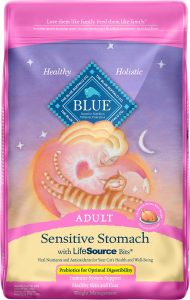
Provide sensitive felines with nutritious and delicious Sensitive Stomach Chicken Recipe, from Blue Buffalo. Designed with sensitive systems in mind, Blue Buffalo’s adult dry cat food contains vitamin and mineral rich natural ingredients. A specially formulated recipe, chock-full of real chicken and probiotics, to fuel a cats muscles, as well as nourish their gut. Blue Buffalo’s Sensitive Stomach Chicken Recipe includes BLUE’s exclusive LifeSource Bits, blended through the assistance of animal nutritionists and veterinarians for optimal cat health.
Formulated with whole grains, fruits and vegetables
Features real, deboned chicken as the first, high-quality protein
Exclusive BLUE’s LifeSource Bits incorporate antioxidant rich vitamins and minerals, thoughtfully blended with the help of vets, and pet nutritionists for optimal health
Dry kibble featuring high quality ingredients, sans corn, soy, wheat, animal by-products, preservatives or artificial flavors.
FOS probiotics promote healthy digestion for the highest nutritional absorption.
Omega-3 and omega-6 fatty acids assist in promoting a shiny coat, and healthy skin.
Deboned Chicken, Chicken Meal, Brown Rice, Oatmeal, Barley, Pea Protein, Peas, Chicken Fat (Preserved With Mixed Tocopherols), Dried Egg Product, Natural Flavor, Flaxseed (Source Of Omega 6 Fatty Acids), Pea Fiber, Menhaden Fish Meal, Fish Oil (Source Of Omega 3 Fatty Acids), DL-Methionine, Calcium Sulfate, Fructooligosaccharide, Calcium Chloride, Calcium Carbonate, Choline Chloride, Potassium Chloride, Potatoes, Dried Chicory Root, Taurine, Dehydrated Alfalfa Meal, Alfalfa Nutrient Concentrate, Salt, Cranberries, Preserved With Mixed Tocopherols, Sweet Potatoes, Carrots, Vegetable Juice For Color, Ferrous Sulfate, Niacin (Vitamin B3), Iron Amino Acid Chelate, Zinc Amino Acid Chelate, Zinc Sulfate, Vitamin E Supplement, Blueberries, Barley Grass, Parsley, Turmeric, Dried Kelp, Yucca Schidigera Extract, Copper Sulfate, Thiamine Mononitrate (Vitamin B1), Copper Amino Acid Chelate, L-Ascorbyl-2-Polyphosphate (Source Of Vitamin C), L-Lysine, Biotin (Vitamin B7), L-Carnitine, Vitamin A Supplement, Manganese Sulfate, Manganese Amino Acid Chelate, Pyridoxine Hydrochloride (Vitamin B6), Calcium Pantothenate (Vitamin B5), Riboflavin (Vitamin B2), Vitamin D3 Supplement, Dried Yeast, Dried Enterococcus Faecium Fermentation Product, Dried Lactobacillus Acidophilus Fermentation Product, Dried Aspergillus Niger Fermentation Extract, Dried Trichoderma Longibrachiatum Fermentation Extract, Dried Bacillus Subtilis Fermentation Extract, Vitamin B12 Supplement, Folic Acid (Vitamin B9), Calcium Iodate, Sodium Selenite, Oil Of Rosemary.
Caloric Content
3,773 kcal/kg, 422 kcal/cup
3. Royal Canin Veterinary Diet Gastrointestinal Fiber Response Dry Cat Food
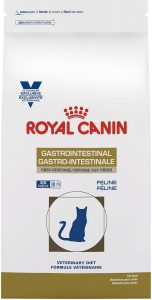
Created especially for felines suffering from digestive issues such as diarrhea, lack of appetite or vomiting, Royal Canin Veterinary Diet Gastrointestinal Fiber Response Dry Food supports healthy digestion. Formulated with a variety of crucial ingredients including soluble and insoluble fibers, and Omega-3 fatty acids (such as fish-derived EPA and DHA).
Created for cats living with common GI sensitivities.
Specially formulated with a blend of soluble and insoluble fiber.
Provides omega-3 fatty acids, in addition to various types of fiber, to sooth the GI tract.
Improves the quality of life in cats suffering from diarrhea, lack of appetite or vomiting.
Chicken By-Product Meal, Chicken Fat, Brown Rice, Brewers Rice, Corn Gluten Meal, Wheat Gluten, Powdered Cellulose, Natural Flavors, Egg Product, Dried Plain Beet Pulp, Potassium Chloride, Fish Oil, Sodium Silico Aluminate, Grain Distillers Dried Yeast, Calcium Sulfate, Sodium Bisulfate, Dl-Methionine, Psyllium Seed Husk, Salt, Fructooligosaccharides, Monosodium Phosphate, Vegetable Oil, Hydrolyzed Yeast, Taurine, Choline Chloride, L-Lysine, Magnesium Oxide, Vitamins [Dl-Alpha Tocopherol Acetate (Source of Vitamin E), L-Ascorbyl-2-Polyphosphate (Source of Vitamin C), Niacin Supplement, Biotin, D-Calcium Pantothenate, Riboflavin Supplement, Pyridoxine Hydrochloride (Vitamin B6), Vitamin A Acetate, Thiamine Mononitrate (Vitamin B1), Vitamin B12 Supplement, Folic Acid, Vitamin D3 Supplement], Marigold Extract (Tagetes Erecta L.), Trace Minerals [Zinc Proteinate, Zinc Oxide, Ferrous Sulfate, Manganese Proteinate, Manganous Oxide, Copper Sulfate, Calcium Iodate, Sodium Selenite, Copper Proteinate], Rosemary Extract, Preserved with Mixed Tocopherols and Citric Acid.
Caloric Content
3,687 kcal/kg, 361 kcal/cup
Top 3 Wet Foods for Cats with Sensitive Stomachs
1. Hill’s Prescription Diet i/d Digestive Care Chicken & Vegetable Stew Canned Cat Food
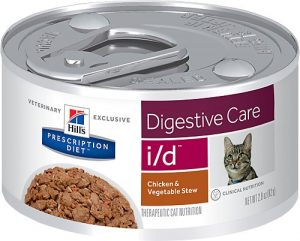
Hill’s utilizes veterinarians and animal nutritionists to develop a clinically nutritional formula for cats suffering from digestion issues. In an easily digestible form, Prescription Diet is helpful for cats recovering from routine surgery, or GI upset or disorders. In order for your cat to build tissue, repair tissue and obtain energy, efficient digestion is essential. Something seemingly insignificant as food sensitivity, lack of digestive enzymes or dietary indiscretion, have a negative affect on a feline’s digestive health. For these reasons, it’s vitally important to offer a kibble thoughtfully blended to optimize digestive health.
Developed by animal nutritionists and veterinarians, in order to manage cats suffering from GI upset and sensitivities.
Featuring a mixed fiber source, in addition to highly digestible protein and fats, assist in tissue repair and nutritional absorption for optimal GI health.
Additional antioxidants help control cell oxidation, a thoughtful blend of nutrients works to encourage recovery and replenish a feline’s body.
Suitable for adults, as well as growing kittens in a highly palatable recipe.
May be helpful for recovering cats suffering from routine surgery, GI upset or various sensitivities, through a blend of easy to digest ingredients.
Water, Chicken, Pork Liver, Carrots, Wheat Gluten, Rice Starch, Rice, Powdered Cellulose, Chicken Fat, Chicken Liver Flavor, Potassium Alginate, Calcium Chloride, Monosodium Phosphate, Soybean Oil, Dicalcium Phosphate, Guar Gum, L-Lysine, Calcium Lactate, Calcium Gluconate, Fructooligosaccharides, Psyllium Seed Husk, Taurine, Potassium Chloride, vitamins (Vitamin E Supplement, L-Ascorbyl-2-Polyphosphate (source of Vitamin C), Thiamine Mononitrate, Niacin Supplement, Pyridoxine Hydrochloride, Calcium Pantothenate, Vitamin B12 Supplement, Riboflavin Supplement, Biotin, Vitamin D3 Supplement, Folic Acid), Choline Chloride, Sodium Tripolyphosphate, Magnesium Oxide, minerals (Zinc Oxide, Ferrous Sulfate, Copper Sulfate, Manganous Oxide, Calcium Iodate), Beta-Carotene.
Caloric Content
71 kcal/2.9 oz can
2. Purina Pro Plan Veterinary Diets EN Gastroenteric Formula Canned Cat Food
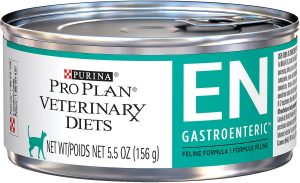
A carefully balanced cat food, optimized for high protein and low carbohydrates, Purina Pro Plan Veterinary Diets EN Gastroenteric Feline Formula supports digestive health. This dry kibble is suitable for adult cats and growing kittens alike, providing optimal nutrition with essential Omega-3 and Omega-6 fatty acids. Additionally, this formula is designed to for sensitives kitties in an easily digestible form.
Specially formulated with high protein levels, and low fiber for optimal intestinal health, in addition to probiotics for a healthy, well-balanced gut.
Well suited for cats suffering from GI upset, such as gastritis, enteritis, IBS, pancreatitis, and other intestinal tract diseases.
Offers optimized nutrition through moderate fat levels, low carbs and high palatability.
Proudly made in the USA
Meat By-Products, Water Sufficient For Processing, Liver, Rice, Chicken Hearts, Soy Protein Isolate, Turkey, Oat Hulls, Calcium Gluconate, Artificial And Natural Flavors, Fish Oil, Inulin, Guar Gum, Tricalcium Phosphate, Potassium Chloride, Taurine, Salt, Magnesium Sulfate, Mono And Dicalcium Phosphate, Vitamin E Supplement, Carrageenan, Zinc Sulfate, Ferrous Sulfate, Thiamine Mononitrate (Vitamin B-1), Niacin (Vitamin B-3), Copper Sulfate, Manganese Sulfate, Calcium Pantothenate (Vitamin B-5), Vitamin A Supplement, Menadione Sodium Bisulfite Complex (Vitamin K), Pyridoxine Hydrochloride (Vitamin B-6), Riboflavin Supplement (Vitamin B-2), Vitamin B-12 Supplement, Biotin (Vitamin B-7), Folic Acid (Vitamin B-9), Potassium Iodide, Vitamin D-3 Supplement.
Caloric Content
970 kcal/kg , 151 kcal/5.5 oz can
3. Royal Canin Veterinary Diet Renal Support D Morsels in Gravy Canned Cat Food
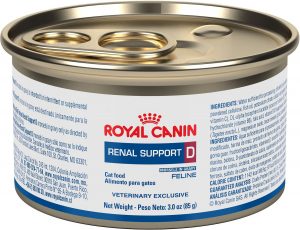
When a feline’s kidney become a concern, reaching for a specially formulated soft food may prevent a loss of appetite. Boasting an attractive texture and enticing flavor, Royal Canin’s Veterinary Diet Renal Support D wet food also offers an energy dense formula. Ensure optimal nutrition in small portions, with ingredients that support renal function: fish oil, specialized protein levels, low phosphorous levels and a precise antioxidant complex.
Created for cats in need of kidney support, with an appetite-stimulating recipe.
Thoughtfully blended to compensate for weaker appetites, through a calorie-rich formula.
Promotes optimal kidney function through a specially formulated blend of antioxidants, fatty acids, targeted protein levels and low level of phosphorous.
Designed to be served in combination with another Royal Canin recipe, Renal Support wet or dry food, or as a standalone meal.
Water Sufficient for Processing, Chicken By-Products, Chicken Liver, Pork Liver, Wheat Flour, Vegetable Oil, Pork Plasma, Modified Corn Starch, Corn Flour, Egg Product, Glycine, Powdered Cellulose, Fish Oil, Potassium Citrate, Calcium Carbonate, Natural Flavors, Taurine, Dl-Methionine, Guar Gum, Fructooligosaccharides, Vitamins [L-Ascorbyl-2-Polyphosphate (Source of Vitamin C), Dl-Alpha Tocopherol Acetate (Source of Vitamin E), Thiamine Mononitrate (Vitamin B1), Niacin Supplement, Biotin, D-Calcium Pantothenate, Riboflavin Supplement, Pyridoxine Hydrochloride (Vitamin B6), Folic Acid, Vitamin B12 Supplement, Vitamin D3 Supplement], Salt, Citric Acid, Choline Chloride, Cysteine, Sodium Silico Aluminate, Sodium Carbonate, Marigold Extract (Tagetes Erecta L.), Magnesium Oxide, Trace Minerals [Zinc Proteinate, Zinc Oxide, Ferrous Sulfate, Copper Sulfate, Manganous Oxide, Calcium Iodate, Sodium Selenite].
Caloric Content
1,142 kcal/kg, 97 kcal/can
FAQs
Q: Which food ingredient is my cat allergic to?
A: Only your veterinarian can confirm your cat’s specific allergy, but soy can be a common allergy, as well as the protein source in their food. Some studies show that beef, chicken and fish are the most likely to cause allergies. If your cat has a protein allergy, hypoallergenic diets are typically recommended.

